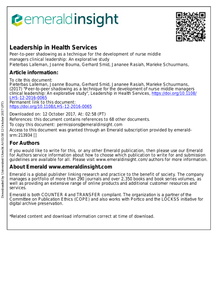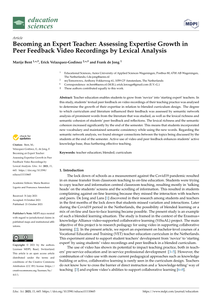The purpose of this study was to explore the experiences and impact of peer-to-peer shadowing as a technique to develop nurse middle managers’ clinical leadership practices. A qualitative descriptive study was conducted to gain insight into the experiences of nurse middle managers using semi-structured interviews. Data were analysed into codes using constant comparison and similar codes were grouped under sub-themes and then into four broader themes. Peer-to-peer shadowing facilitates collective reflection-in-action and enhances an “investigate stance” while acting. Nurse middle managers begin to curb the caring disposition that unreflectively urges them to act, to answer the call for help in the here and now, focus on ad hoc “doings”, and make quick judgements. Seeing a shadowee act produces, via a process of social comparison, a behavioural repertoire of postponing reactions and refraining from judging. Balancing the act of stepping in and doing something or just observing as well as giving or withholding feedback are important practices that are difficult to develop.
DOCUMENT

Binnen de nieuwe opleiding Social Work van de Hogeschool Utrecht is gehoor gegeven aan de toenemende wens van studenten om meer te doen met eigen ervaringen met psychische kwetsbaarheid. Deze wens is onder meer vertaald in een peersupportgroep voor studenten, die in de periode maart t/m juni in 2018 en 2019 liep. Veel studenten beschikken over een behoorlijk potentieel aan ervaringskennis wat door middel van peer support in een veilige setting kan worden verkend. Deelnemers worden zich bewust van dit potentieel door hierop met elkaar reflecteren en (verder) te ontwikkelen. Een peer support groep werkt taboedoorbrekend en biedt ondersteuning aan studenten met een psychische kwetsbaarheid. Peer support ondersteunt ook aankomend professionals gebruik te maken van eigen kwetsbaarheid. Voor veel (aankomend) hulpverleners was het tot voor kort ongebruikelijk om dit te doen. Intussen worden de verhoudingen tussen cliënt en hulpverlener anders gedefinieerd en richt de (herstelgerichte) zorg zich steeds nadrukkelijker op destigmatisering, de inzet van ervaringsdeskundigheid, gelijkwaardigheid en openheid in de begeleidingsrelatie. Peer support-programma’s worden steeds vaker geïmplementeerd in (zorg)organisaties om mensen te helpen omgaan met problemen, maar spelen ook in de beroepsontwikkeling van aankomend sociaal werkers een belangrijke rol. Deze rapportage is een samenvoeging van een eerdere interne rapportage van de peer supportgroep uit 2018 (Leunen; Lamers & Van Slagmaat, 2018) en een evaluatie van de peer supportgroep in 2019.
DOCUMENT

Het participatie project richt zich op het ontwikkelen van interventies ter bevordering van de actieve maatschappelijke participatie van jongeren met psychische en/of gedragsproblematiek in Amsterdam. Onderzoekers van de Hogeschool van Amsterdam werkten samen met professionals en jongeren van de Arkin FACT-teams en Spirit! aan interventies gericht op het thema 'sociale steun'. Spirit implementeert een online kennisarrangement omtrent het thema eenzaamheid met als doel kennisvergroting van professionals op het gebied van eenzaamheid. Voor Fact is er een handreiking ontwikkelt voor het opzetten van peer-to-peer suportgroepen.
DOCUMENT

The Internet offers many opportunities to provide parenting support. An overview of empirical studies in this domain is lacking, and little is known about the design of webbased parenting resources and their evaluations, raising questions about its position in the context of parenting intervention programs. This article is a systematic review of empirical studies (n = 75), published between 1998 and 2010, that describe resources of peer and professional online support for parents. These studies generally report positive outcomes of online parenting support. A number of recent experimental studies evaluated effects, including randomized controlled trials and quasi-experimental designs (totaling 1,615 parents and 740 children). A relatively large proportion of the studies in our sample reported a content analysis of emails and posts (totaling 15,059 coded messages). The results of this review show that the Internet offers a variety of opportunities for sharing peer support and consulting professionals. The fi eld of study refl ects an emphasis on online resources for parents of preschool children, concerning health topics and providing professional support. A range of technologies to facilitate online communication is applied in evaluated websites, although the combination of multiple components in one resource is not very common. The fi rst generation of online resources has already changed parenting and parenting support for a large group of parents and professionals. Suggestions for future development and research are discussed.
LINK
The Internet offers many opportunities to provide parenting support. An overview of empirical studies in this domain is lacking, and little is known about the design of web based parenting resources and their evaluations, raising questions about its position in the context of parenting intervention programs. This article is a systematic review of empirical studies (n = 75), published between 1998 and 2010, that describe resources of peer and professional online support for parents. These studies generally report positive outcomes of online parenting support. A number of recent experimental studies evaluated effects, including randomized controlled trials and quasi-experimental designs (totaling 1,615 parents and 740 children). A relatively large proportion of the studies in our sample reported a content analysis of e-mails and posts (totaling 15,059 coded messages). The results of this review show that the Internet offers a variety of opportunities for sharing peer support and consulting professionals. The field of study reflects an emphasis on online resources for parents of preschool children, concerning health topics and providing professional support. A range of technologies to facilitate online communication is applied in evaluated Web sites, although the combination of multiple components in one resource is not very common. The first generation of online resources has already changed parenting and parenting support for a large group of parents and professionals. Suggestions for future development and research are discussed.
DOCUMENT

The first year of study is very exciting for many students. Everything is new: the school, your schedule, the teachers, and your fellow students. How can a university ensure a smooth transition for first-year students? For this, Inholland launched the Students for Students (S4S) project in the 2019-2020 academic year. In this project, second-year students (studentcoaches) support first-year students with their studies. They do this based on their own experience and the training they receive during their year as studentcoaches. Research shows that peer-mentoring is very successful in aiding first-year students through their first year of the study program. Peer-mentoring has the potential to increase well-being, social bonding, the feeling of belonging, and student resilience. It also ensures smoother academic integration, as peer-mentoring focuses on developing academic skills as well. Additionally, a studentcoach is often a low threshold point of contact for students where they can go with questions.
DOCUMENT

A considerable amount of literature on peer coaching suggests that the professional development of teachers can be improved through experimentation, observation, reflection, the exchange of professional ideas, and shared problem-solving. Reciprocal peer coaching provides teachers with an opportunity to engage in such activities in an integrated form. Even though empirical evidence shows effects of peer coaching and teacher satisfaction about coaching, the actual individual professional development processes have not been studied extensively. This article offers a way to analyze and categorize the learning processes of teachers who take part in a reciprocal peer coaching trajectory by using the Interconnected Model of Teacher Professional Growth as an analytical tool. Learning is understood as a change in the teacher's cognition and/or behavior. The assumption underlying the Interconnected Model of Teacher Professional Growth is that change occurs in four distinct domains that encompass the teacher's professional world: the personal domain, the domain of practice, the domain of consequence and the external domain. Change in one domain does not always lead to change in another, but when changes over domains do occur, different change patterns can be described. Repeated multiple data collection methods were used to obtain a rich description of patterns of change of four experienced secondary school teachers. The data sources were: audiotapes of coaching conferences, audiotapes of semi-structured learning interviews by telephone, and digital diaries with teacher reports of learning experiences. Qualitative analysis of the three data sources resulted in two different types of patterns: including the external domain and not including the external domain. Patterns of change within a context of reciprocal peer coaching do not necessarily have to include reciprocal peer coaching activities. When, however, patterns do include the external reciprocal peer coaching domain, this is often part of a change process in which reactive activities in the domains of practice and consequence are involved as well. These patterns often demonstrate more complex processes of change.
DOCUMENT

Behaviour Change Support Systems (BCSS), already running for the 10th time at Persuasive Technology, is a workshop that builds around the concept of systems that are specifically designed to help and support behaviour change in individuals or groups. The highly multi-disciplinary nature of designing and implementing behaviour change strategies and systems for the strategies has been in the forefront of this workshop from the very beginning. The persuasive technology field is becoming a linking pin connecting natural and social sciences, requiring a holistic view on persuasive technologies, as well as multi-disciplinary approach for design, implementation, and evaluation. So far, the capacities of technologies to change behaviours and to continuously monitor the progress and effects of interventions are not being used to its full potential. The use of technologies as persuaders may shed a new light on the interaction process of persuasion, influencing attitudes and behaviours. Yet, although human- computer interaction is social in nature and people often do see computers as social actors, it is still unknown how these interactions re-shape attitude, beliefs, and emotions, or how they change behaviour, and what the drawbacks are for persuasion via technologies. Humans re-shape technology, changing their goals during usage. This means that persuasion is not a static ad hoc event but an ongoing process. Technology has the capacity to create smart (virtual) persuasive environments that provide simultaneously multimodal cues and psycho-physiological feedback for personal change by strengthening emotional, social, and physical presence. An array of persuasive applications has been developed over the past decade with an aim to induce desirable behaviour change. Persuasive applications have shown promising results in motivating and supporting people to change or adopt new behaviours and attitudes in various domains such as health and wellbeing, sustainable energy, education, and marketing. This workshop aims at connecting multidisciplinary researchers, practitioners and experts from a variety of scientific domains, such as information sciences, human-computer interaction, industrial design, psychology and medicine. This interactive workshop will act as a forum where experts from multiple disciplines can present their work, and can discuss and debate the pillars for persuasive technology.
MULTIFILE

Teacher education enables students to grow from ‘novice’ into ‘starting expert’ teachers. In this study, students’ textual peer feedback on video recordings of their teaching practice was analysed to determine the growth of their expertise in relation to blended curriculum design. The degree to which curriculum and literature influenced their feedback was assessed by semantic network analysis of prominent words from the literature that was studied, as well as the lexical richness andsemantic cohesion of students’ peer feedback and reflections. The lexical richness and the semantic cohesion increased significantly by the end of the semester. This means that students incorporated new vocabulary and maintained semantic consistency while using the new words. Regarding the semantic network analysis, we found stronger connections between the topics being discussed by the students at the end of the semester. Active use of video and peer feedback enhances students’ activeknowledge base, thus furthering effective teaching.
DOCUMENT

Just what and how eight experienced teachers in four coaching dyads learned during a 1-year reciprocal peer coaching trajectory was examined in the present study. The learning processes were mapped by providing a detailed description of reported learning activities, reported learning outcomes, and the relations between these two. The sequences of learning activities associated with a particular type of learning outcome were next selected, coded, and analyzed using a variety of quantitative methods. The different activity sequences undertaken by the teachers during a reciprocal peer coaching trajectory were found to trigger different aspects of their professional development.
DOCUMENT
